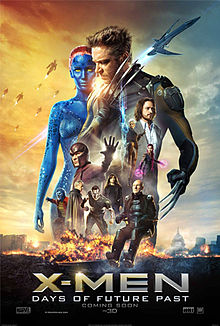THE AISLE SEAT - by Mike McGranaghan
"X-MEN: DAYS OF FUTURE PAST"

The X-Men movies have run the gamut from generally beloved (X2: X-Men United) to near-unanimously loathed (X-Men Origins: Wolverine). Perhaps for this reason – and because the last installment, X-Men: First Class, was the lowest grossing in the series – the powers that be have turned to one of the most acclaimed storylines in X-Men comics history for inspiration. X-Men: Days of Future Past adapts, and slightly alters, the 1981 run created by Chris Claremont, John Byrne, and Terry Austin. As a longtime X-Men fan, I've found something to enjoy in all the movies, even those that are admittedly flawed, but there's really no doubt that this ranks among the best of them.
The story begins in the future, where mutants are hunted down by sentient robots, known as Sentinels. It's a bleak time in which people like Professor X (Patrick Stewart) and Magneto (Ian McKellen) are running for their lives. Holed up in a Chinese monastery, they and some other X-Men hatch a risky plan. Kitty Pryde (Ellen Page) uses her powers to send the consciousness of Wolverine (Hugh Jackman) back in time. (In the comics, it was Kitty herself who went back.) Inside his 1973 body, he then tries to prevent Mystique (Jennifer Lawrence) from murdering Bolivar Trask (Peter Dinklage), the man who figured out how to exploit mutant genes, thereby making the invention of his Sentinels possible. What Mystique doesn’t know is that killing Trask will inspire an intense fear of mutants that will allow for the Sentinels to rise, thereby spelling doom in the future. In order to find her, Wolverine has to enlist the help of the young Professor X (James McAvoy), who is in the middle of a crisis of conscience, and the imprisoned Magneto (Michael Fassbender). Also lending a hand is Hank McCoy (Nicholas Hoult), a.k.a. Beast.
After four X-Men films and two Wolverine spinoffs, a fairly full world has been created onscreen. Days of Future Past capitalizes on that, mixing together characters and cast members from all iterations of the franchise. It's a gamble that works, even if there are occasional continuity problems. Because the mutants are so well-established by now, the film is free to explore the dynamics between them: how the rivalry between Professor X and Magneto has changed over the years; how Mystique is so convinced her actions are justified that she doesn't listen to her mentor Magneto when he surprisingly opposes her; the way tables are turned and Wolverine must act as teacher to the young Professor X. These are just a few examples of how the film pays off more than a decade of audience investment. It's hugely satisfying to have these things be the general focus of the movie, especially in a time when most superhero pictures are struggling to go bigger and more outrageous with action. The actors are quite at home in their roles, each of them bringing new layers of depth.
When Days of Future Past does break out the action, it does so with consummate skill. Director Bryan Singer returns to the series after some time off, and he comes back with a sense of purpose. Every action scene is crafted in service of the plot. Singer makes sure the threat to the mutants (and to humanity in general) is palpable at all times, so that the action means something. Nowhere is this more evident than in the thrilling conclusion, which is a great example of how cutting back and forth between two different, but simultaneously occurring things can build tension. The other highlight is a spellbinding sequence in which a new mutant named Quicksilver (Evan Peters) uses his super-speed to take down some cops who are shooting at Professor X, Magneto, and Wolverine. Shot in slow motion (and absolutely eye-popping when seen in 3D), the sequence finds him merrily jogging around a room, fiddling with things in the environment in order to change the outcome of something that takes place in a millisecond. It's so good, one hopes for a Quicksilver spinoff some day – or at least an expanded role in the next sequel.
Perhaps the best element of the X-Men franchise, on screen and on paper, has been its emphasis on the idea that mutants represent outsiders of any stripe. That gives it a grounding that's essential. We come to care about the characters as human beings, rather than just as superheroes. Days of Future Past takes maximum advantage of this, tossing in a handful of moments designed to reward those who have stuck with the movie series through its ups and downs. Rather than feeling like fan pandering, they have a nice emotional quality, allowing us not only to see some old friends again but also to remember what it was about them that impacted us in the first place. Days of Future Past takes on a lot – maybe a slight bit too much – yet hits that sweet spot of being really exciting and just substantive enough to earn our engagement. In the comic book-movie realm, it sits comfortably in the upper echelon.
(![]()
![]()
![]() 1/2 out of four)
1/2 out of four)
X-Men: Days of Future Past is rated PG-13 for sequences of intense sci-fi violence and action, some suggestive material, nudity and language. The running time is 2 hours and 11 minutes.
Buy a copy of my book, "Straight-Up Blatant: Musings From The Aisle Seat," on sale now at Lulu.com! Paperback and Kindle editions also available at Amazon.com!


